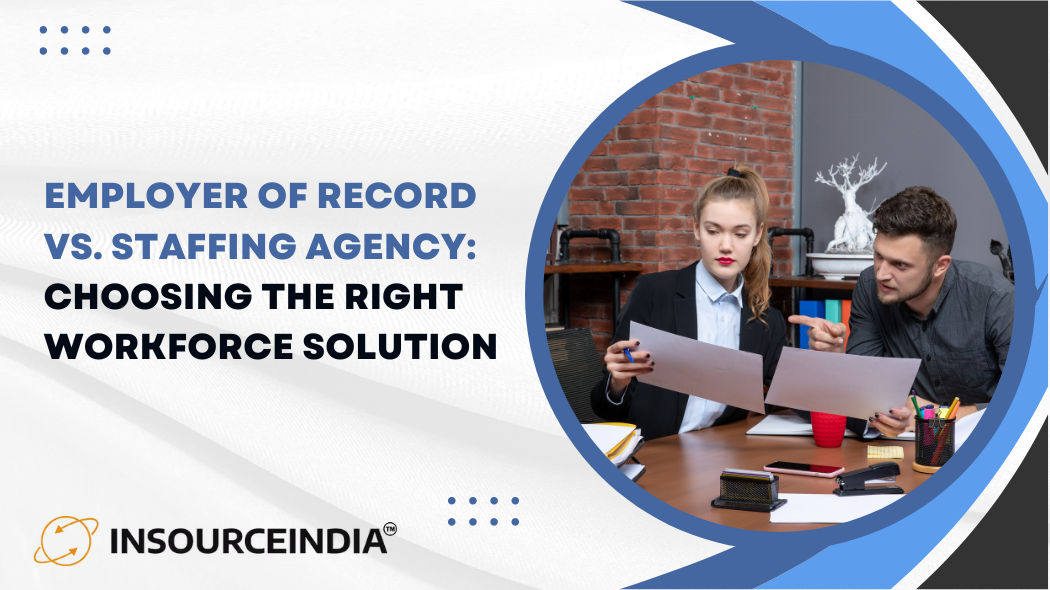In today’s dynamic and competitive business landscape, companies are continually seeking flexible and efficient ways to manage their workforce. Two prominent options that have gained popularity are Employer of Record (EOR) services and Staffing Agencies. Both solutions offer unique benefits, but they cater to different needs and objectives. In this blog, we’ll explore the differences between an Employer of Record and a Staffing Agency to help you make an informed decision for your business.
Understanding Employer of Record (EOR)
An Employer of Record is a service provider that acts as the official employer for the workers assigned to a client company. When a company partners with an EOR, it transfers the administrative and legal responsibilities of hiring, payroll, benefits, and compliance to the EOR. Essentially, the EOR takes care of all the HR-related tasks, allowing the client company to focus solely on its core business functions.
Key Benefits of Employer of Record:
- Compliance and Risk Mitigation: One of the most significant advantages of an EOR is its ability to handle complex employment laws and regulations. They ensure that all workers are correctly classified, and that the client company remains compliant with tax laws and employment regulations, thus minimizing the risk of potential legal issues.
- Scalability and Flexibility: EOR services are particularly valuable for companies looking to expand into new markets or scale their operations rapidly. The EOR takes care of all employment aspects, making it easy to onboard new employees or contractors without having to establish a legal entity in different regions.
- Enhanced Focus on Core Business: By outsourcing HR responsibilities to an EOR, a company can streamline its operations and concentrate on strategic objectives, innovation, and growth, without getting bogged down by the intricacies of HR management.
- Employee Benefits and Payroll: The EOR takes care of payroll processing, tax withholdings, benefits administration, and other employment-related tasks, which reduces the administrative burden on the client company.
The Role of a Staffing Agency
A Staffing Agency, on the other hand, acts as an intermediary between job seekers and client companies looking to hire temporary or contract workers. Staffing agencies maintain a pool of potential candidates, and when a client company needs temporary staffing, the agency finds suitable candidates to fill the roles. The staffing agency is responsible for the recruitment, screening, and placement of employees.
Key Benefits of Staffing Agencies:
- Quick Access to Talent: Staffing agencies have access to a diverse talent pool, making it easier and faster for companies to find suitable candidates for temporary or project-based roles.
- Flexibility: Staffing agencies provide an excellent solution for companies facing short-term staffing needs or uncertain project durations. They can quickly adjust the number of temporary workers as required by the client.
- Reduced Hiring Burden: With staffing agencies handling the hiring process, companies can save time and resources in the recruitment process, which can be especially helpful when they need to fill multiple positions quickly.
- Skills Testing and Screening: Staffing agencies often assess candidates’ skills and conduct background checks, ensuring that the candidates they present to the client have the necessary qualifications for the role.
Which Option is Right for You?
The choice between an Employer of Record and a Staffing Agency depends on the specific requirements and goals of your company:
- Choose an Employer of Record if:
- You are expanding into new markets or working with remote employees and need assistance with compliance and legal matters.
- You want to focus on core business operations and prefer outsourcing HR and administrative tasks.
- You need a long-term employment solution for your workforce.
- Choose a Staffing Agency if:
- You have short-term projects or seasonal staffing needs.
- You want to quickly fill temporary positions without investing heavily in recruitment efforts.
- You need access to a diverse pool of skilled candidates for specialized roles.
Below is a comparison table highlighting the key differences between an Employer of Record (EOR) and a Staffing Agency:
| Aspect | Employer of Record (EOR) | Staffing Agency |
| Employment Relationship | Acts as the official employer for workers assigned to the client company. | Acts as an intermediary for hiring temporary or contract workers. |
| HR & Administrative Tasks | Handles all HR, payroll, benefits, and compliance tasks. | Typically, not involved in HR and administrative tasks. |
| Compliance & Risk Management | Ensures compliance with employment laws and regulations, mitigating potential legal risks. | Often not responsible for compliance matters as it is not the employer of record for the workers. |
| Scalability & Flexibility | Ideal for companies expanding into new markets or rapidly scaling operations. | Provides quick access to talent for short-term or project-based needs. |
| Employee Benefits & Payroll | Manages payroll, benefits administration, and tax withholdings for workers. | Typically, not responsible for employee benefits and payroll. |
| Hiring Process | May or may not be involved in the hiring process, depending on the agreement. | Responsible for the recruitment, screening, and placement of workers. |
| Focus on Core Business | Allows the client company to focus on its core business operations. | Reduces the hiring burden for the client company. |
| Duration of Employment | Suitable for long-term employment needs. | Provides short-term/temporary staffing solutions. |
| Skill Testing & Screening | May conduct skills testing and background checks, ensuring qualified candidates. | Often assesses candidate skills and conducts basic screenings. |
To conclude, an Employer of Record and a Staffing Agency serve different purposes, and the decision depends on your company’s specific needs and objectives. Consider the scale of your operations, the nature of the roles you need to fill, and your long-term business goals when choosing the right workforce solution. Partnering with the appropriate service provider can significantly streamline your HR processes and help you focus on achieving your business objectives efficiently.

